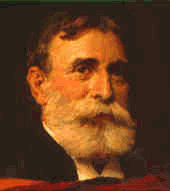
The Authority and Inspiration of the Scriptures by Benjamin B. Warfield (1851-1921)
The following is a portion of a short essay originally published in the Westminster Teacher, September 1889. The electronic edition of this article was scanned and edited by Shane Rosenthal for Reformation Ink. It is in the public domain and may be freely copied and distributed.
"Now it goes, of course, without saying, that the apostles were not given this supreme authority as legislators to the Church without preparation for their high functions, without previous instruction in the mind of Christ, without safeguards thrown about them in the prosecution of their task, without the accompanying guidance of the Holy Spirit. And nothing is more noticeable in the writings which they have given the Church than the claim which they pervasively make that in giving them they are acting only as the agents of Christ, and that those who wrote them wrote in the Spirit of Christ. What Paul writes he represents to be “the commandments of the Lord” (1 Cor 14:37), which he therefore transmits in the name of the Lord (2 Thess 3:6); and the gospel that Peter preached was proclaimed in the Holy Ghost (1 Pet 1:12). Every Scripture of the Old Testament is inspired by God (2 Tim 3:16), and the New Testament is equally Scripture with the Old (1 Tim 5:18); all prophecy of Scripture came from men who spake from God, being moved by the Holy Ghost ( 2 Pet 1:20) and Paul’s Epistles differ from these older writings only in being “other”; that is, newer Scriptures of like kind (2 Pet 3:16). When we consider the promises of supernatural guidance which Christ made to his apostles (Matt. 10:19, 20; Mark 13:11; Luke 21:14; John 14 and 16), in connection with their claim to speak with divine authority even when writing (1 Cor 14:37; 2 Thess 3:6), and their conjunction of their writings with the Old Testament Scriptures as equally divine with them, we cannot fail to perceive that the apostles claim to be attended in their work of giving law to God’s Church by prevailing superintending grace from the Holy Spirit. This is what is called inspiration. It does not set aside the human authorship of the books. But it puts behind the human also a divine authorship. It ascribes to the authors such an attending influence of the Spirit in the process of writing, that the words they set down become also the words of God; and the resultant writing is made not merely the expression of Paul’s or John’s or Peter’s will for the churches, but the expression of God’s will. In receiving these books from the apostles as law, therefore, the Church has always received them not only as books given by God’s agents, but as books so given by God through those agents that every word of them is God’s word."
The last installment is forthcoming...











